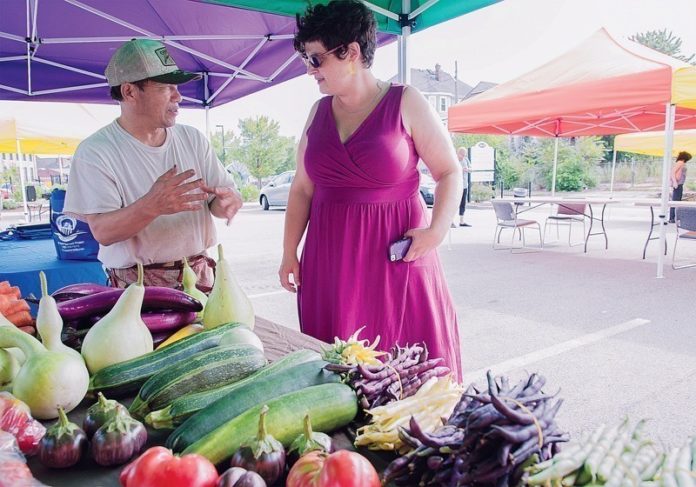
PROVIDENCE – The Department of Environmental Management said that farm viability grants totaling $255,543 have been awarded for projects that will enhance the competitiveness of specialty crops grown in Rhode Island.
The funds are from the U.S. Department of Agriculture’s Specialty Crop Block Grant program. Specialty crops are defined by this federally-supported program as fruits and vegetables, dried fruit, tree nuts and nursery crops, including floriculture and turf grass production.
“These grants will help promote the long-term viability of agriculture in Rhode Island by strengthening markets for specialty crops and sustaining the livelihood of our state’s farmers,” DEM Director Janet Coit said in a press release.
The grants will be used to enhance food safety practices among farmers and produce vendors at farmers’ markets; increase consumption of specialty crops by the Latino population and decrease obesity rates among participating families; and support agricultural research at Rhode Island College on the honeybee population.
The following is a list of projects awarded funding:
- $37,752 for the Rhode Island Good Agricultural Practices Program, a partnership between the University of Rhode Island’s nutrition and food sciences department and DEM’s Division of Agriculture, to provide growers with training and support to become part of the state RIGAP certified grower program
- $40,000 to Farm Fresh Rhode Island for the RI Farm to Cafeteria Project, designed to bring Rhode Island institutional buyers such as schools, hospitals, state agencies and worksites together with Rhode Island farmers to develop sustainable purchasing agreements
- $10,300 to the Northeast Organic Farming Association of Rhode Island, to increase production and consumption of certified organic specialty crops in Rhode Island by providing outreach, education and technical assistance to farmers
- $35,400 to New Urban Farmers, to support a collaborative effort with the Pawtucket Housing Authority that promotes the use of specialty crops among Latino residents living in two-family development complexes in Pawtucket
- $22,736 to the Rhode Island College Honey Bee Study, to conduct a survey of the health and size of the state’s honeybee populations along with the incidence of the small hive beetle. Survey data generated will represent baseline data for further monitoring of the bee population in Rhode Island. Educational outreach will be conducted to promote beekeeping and bolster bee populations, and mitigation strategies will be assessed to reduce the impact of the SHB. The goal of the study is to increase the size of the bee population and enhance the ability to pollinate specialty crops in the state
- $31,398 to the University of Rhode Island Division of Research and Economic Development to conduct a study entitled, “De-Tasseling Sweet Corn to Prevent Bird Damage: An Alternative to Cannons?” This project is designed to address bird damage to sweet corn, which is a major specialty crop in Rhode Island both in acreage and in value. Uncontrolled feeding by flocks of birds can result in the loss of entire plantings of sweet corn. Currently the most effective and affordable control option for farmers is propane-fueled bird cannons, which emit a sonic blast every 40 seconds to 30 minutes to frighten birds. It has been reported that removing the tassel from corn plants after pollination decreases bird damage and may be an effective alternative to bird cannons. The study will evaluate the effectiveness of de-tasseling at preventing bird damage, measure its effect on corn yield and quality, and determine if de-tasseling provides sufficient benefits to growers to justify the expense
- $6,000 to Harvest New England Association Inc. for an educational program designed to increase sales and consumption of regional specialty crops by New England consumer, specialty crop producers and wholesalers of specialty crops.
In addition to the grants, $71,957 in funding is being provided to DEM’s Division of Agriculture to continue to increase demand and consumption of Rhode Island-grown specialty crops by expanding on the “Rhode Island Grown Get Fresh Buy Local” initiative through produce preparation demonstrations featuring local celebrity chefs at all Rhode Island farmers markets and participating roadside stands; updating its Rhode Island agricultural display; and enhancing the marketing program by making advertising material available to farmers.










